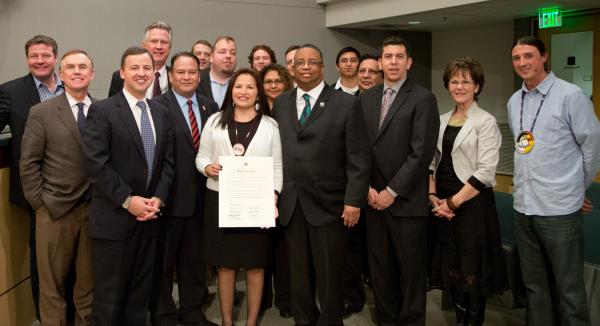
Councilmembers are joined by representatives of the region’s Indigenous Communities as the Council declared Feb. 7, 2015 “Native American Expulsion Remembrance Day.” Claudia Kauffman, Intergovernmental Affairs with the Muckleshoot Indian Tribe, is holding the proclamation.
It was 150 years ago that Seattle’s first city council banned Native Americans from entering the city. But the pain from that act continued to be felt by succeeding generations as bigotry and injustice followed.
The exclusion ordinance was enacted in 1865. The following year, the local representative in Congress, Arthur Denny, opposed the establishment of a reservation for the Duwamish, further bolstering the Duwamish diaspora. Twenty-eight years later, in 1894, settlers burned to the ground the last Duwamish longhouse in the area. Today, the Duwamish Tribe is still fighting to restore its relationship with the United States, with whom it signed the Treaty of Point Elliott of 1855.
The bigotry and injustice of Seattle’s exclusion ordinance was “a lesson that generations thereafter continue, unfortunately, to repeat,” King County Councilman Rod Dembowski said on February 2. “We had the Chinese Exclusion Act [of 1882]. The Japanese American community was excluded in the [Second World] War. Hopefully we don’t ever see that again.”
The King County Council took a step to help heal the pain. The council proclaimed February 7, the 150th anniversary of the Seattle exclusion ordinance, as Native American Expulsion Remembrance Day.
Councilman Larry Gossett, who with Dembowski introduced the proclamation, noted that the 1865 exclusion ordinance came just 13 years after Si’ahl, the leader of the Duwamish people for whom the city of Seattle was named, welcomed the first settlers and helped them survive here. Exclusion “was extremely hurtful to the Native Americans who had for thousands of years made this their homeland,” Gossett said.
Several local Native American leaders spoke at the proclamation hearing, thanking the King County Council for the effort to promote healing and understanding.
“It is so vital and important to remember our history, whether good or bad, whether positive or extremely negative,” said Claudia Kauffman, Nez Perce, a former state senator. “We need to make sure everyone knows about our history, about our strengths, about our talents and resilience,” the latter a reference to the fact that Native Americans still live in Seattle, are educated in Seattle, are involved in Seattle, and raise their families in Seattle. “Seattle and King County [have] a rich history, and we need to celebrate it and celebrate it every day,” she said.
Chris Stearns, Navajo, former chairman of the Seattle Human Rights Commission who now chairs the state Gambling Commission, said, “What you are doing is incredibly important. As the senator said, Native Americans are here. The city, the county were built on the foundation that is Native America. I’d also like to say that we are the future. There are some wonderful young leaders and young elected officials [in the Seattle area].” The proclamation “really means a lot to us. And I think it’s something the council can truly build upon.”
Matt Remle, Lakota, an educator and journalist, offered a greeting in Lakota and acknowledged the Duwamish people, “on whose lands we are on today … I too am a guest in their lands as a Lakota person.”
Remle said the proclamation “goes well with the recent actions by the Seattle City Council to establish Indigenous Peoples Day on the second Monday of every October and efforts by the Seattle School Board to bring forth the ‘Since Time Immemorial’ Tribal Sovereignty Curriculum. It fits well with trying to educate about the misinformation — and [the] histories that a lot of us didn’t get in our schools.”
It’s not the first time King County has taken a stand to promote healing and correct injustice. In 1986, the County Council renamed the county in honor of the Rev. Dr. Martin Luther King Jr. The county was originally named in honor of William Rufus de Vane King, a pro-slavery U.S. senator from Alabama who served as U.S. vice president in 1853.
Read more at http://indiancountrytodaymedianetwork.com/2015/02/10/king-county-council-remembers-1865-exclusion-native-americans-159130
